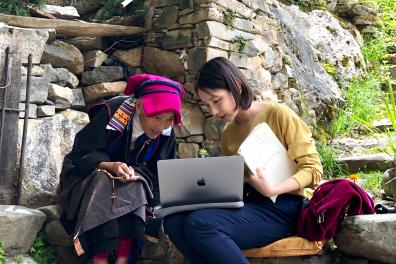Fundamental and applied research
Inalco's researchers and research teams work on all the world's major regions (Europe, Asia, Africa, the Americas, Oceania), taking a situated, thematic and (inter)disciplinary approach. Research is conducted by 14 teams, half of which are under joint supervision with the CNRS and IRD research organizations.

Research is supported by 14 teams, often in partnership with research organizations, top-level doctoral training and an international publications department.
Fundamental and applied research. A novel approach, both theoretical and practical
The specificity of research at Inalco lies in an approach that combines four dimensions: in-depth knowledge of the cultural areas concerned, mastery of the languages of the region studied, a disciplinary approach and research conducted in the field using local sources (ethnographic observations, interviews, document collection, etc.). The study of societies and cultures is thus based on solid theoretical and methodological foundations, with a central epistemological emphasis on the local language as an indispensable medium of cultural knowledge. It is this approach to cultures, societies and civilizations, supported by a decentralized view of its research objects, that ensures the dynamism, relevance and specificity of Inalco's research in the national and international field of cultural area studies. In a world that is increasingly complex to decipher, this specificity offers indispensable keys to understanding global and local, national and international exchanges and issues.
Strengthened support for doctoral students
Inalco supports doctoral students throughout their training, from registration to thesis defense, offering them high-level training in cultural areas and the main disciplines of the humanities and social sciences. Together with the Collège des Écoles doctorales and the Centre de formation des doctorants à l'insertion professionnelle de Sorbonne Paris Cité, the Institute also helps to enhance the value of the doctorate with regard to the professional world, and to develop doctoral students' operational skills and adaptability.
An organization at the service of research
A building entirely dedicated to research houses the teams, the Doctoral School and its administration providing all support functions: support in responding to calls for projects and organizing scientific events, internal funding, publication aids, help in finding partnerships and funding and communication.
Research units
By cultural area:
- Centre Asie du Sud-Est (CASE - UMR 8170)
- Centre de Recherches Europes-Eurasie (CREE - EA4513)
- Centre de Recherche Moyen-Orient et Méditerranée (CERMOM - EA 4091)
- French Institute for Research on East Asia (IFRAE - UMR 8043)
- Languages et Cultures du Nord de l'Afrique et Diasporas (LACNAD - EA 4092)
- Centre de recherche sur le monde iranien (CERMI - UMR 8041)
By discipline:
- Centre de Recherches Linguistiques sur l'Asie Orientale (CRLAO - UMR 8563)
- Centre d'Étude et de Recherche sur les Littératures et les Oralités du Monde (CERLOM - EA 4124)
- Research team: " Textes, Informatique, Multilinguisme " (ER-TIM - EA 2520)
- Language, langues et cultures d'Afrique noire (LLACAN - UMR 8135)
- Plurality of Languages and Identities in Didactics: Acquisition, Médiations (PLIDAM - EA 2502)
- Structure et dynamique des langues (SeDYL - UMR 8202)
- Centre d'Etudes en Sciences Sociales sur les Mondes Africains, Américains et Asiatiques (CESSMA - UMR 245)
- Languages and civilizations with an oral tradition (LACITO - UMR7107)
Key figures
- 235 full professors-researchers
- 300 PhD students
- 14 research teams
- 200 scientific events per year